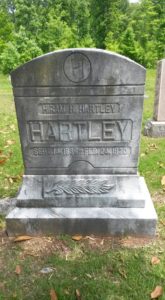AUTHOR: Linda H. Barnette (edited and vetted by Cheri Todd Molter)
Hiram Hamilton Hartley, known as H. H. or “Hi” to friends and family, was my great-great-grandfather. Born in Davidson County, N. C. in 1839, Hartley was a plantation owner who had inherited his father’s land and had successfully added acreage of his own. Deeds show that, at one time, he owned over 5,000 acres in Davidson and Davie counties. He was married three times; his first two wives died in childbirth. Hartley’s third wife was an older lady who had been the governess for his children. Altogether, he had thirteen children who survived to adulthood.
Hartley left the farm, his young wife, and their first child to go fight for the Confederacy during the Civil War. He, and a group of his neighbors, traveled to Raleigh to enlist on July 15, 1862. He was 23 years old and served in Company K, of the 15th N. C. Infantry. According to North Carolina Troops 1861-65, A Roster, Hartley was captured at Crampton’s Gap, Maryland a month later, then held at Ft. Delaware until October 2, 1862. He was recorded as AWOL on Nov. 12, 1862 but returned to his company a few months later, on May 29, 1863. Hartley was captured again on May 12, 1864 and taken to Point Lookout, Maryland, where he was held for about three months. Afterward, he was transferred to Elmira, New York, where he spent over six months at arguably one of the most horrid prison camps for Confederate soldiers. Experiencing the misery, cold, starvation, disease, and all of the other hardships of this place could have killed him, as it did thousands of others, yet he survived. He must have been a very tough person! In February 1865, Hartley was paroled from Elmira and transferred twice within a couple weeks’ time, first to Boulware & Cox’s Wharves, Virginia and later, by Feb. 23, 1865, to Camp Lee, Virginia.
I believe that his experiences in the war led him into a life of public service because as he matured, he was active in both politics and business in his county. Hartley was a magistrate for forty years and performed hundreds of weddings in his home. (I had the pleasure of seeing his house once before it was lost to time, torn down to make room for a beautiful, modern house). He was a county commissioner and, later, served as a member of the North Carolina legislature from 1901 until 1903. Hartley also generously helped save Yadkin College from financial ruin. Furthermore, he was faithful to both his family and his church.
In some ways, he was ahead of his time: In his will, he prepared a pre-nuptial agreement with his third wife. Plus, Hartley left property to his daughter, Ellen, at a time in which males usually inherited most of the property. Additionally, Ellen was educated at Greensboro College, and Hartley’s sons were also sent to college.
 What impressed me most about Hiram Hartley was his dedication to public office, and thus his commitment to serving others. Although not on a state level, my dad and I have followed in his tradition. Daddy served 14 years on our town board, and I spent six years on the local school board. I feel that serving one’s community is a noble calling. I never met him, of course, but I wish I had. In my imagination, he looks like my dad and grandfather—tall, slim, with reddish hair, large ears, an aquiline nose, and blue, twinkling eyes!!
What impressed me most about Hiram Hartley was his dedication to public office, and thus his commitment to serving others. Although not on a state level, my dad and I have followed in his tradition. Daddy served 14 years on our town board, and I spent six years on the local school board. I feel that serving one’s community is a noble calling. I never met him, of course, but I wish I had. In my imagination, he looks like my dad and grandfather—tall, slim, with reddish hair, large ears, an aquiline nose, and blue, twinkling eyes!!
My grandfather once told me that his grandfather had quite a temper and that he could tell what kind of mood he was in by the way he handled the horses coming down the long driveway!! How I wish I had asked him more about our ancestors!
(Click on photo to enlarge.)
